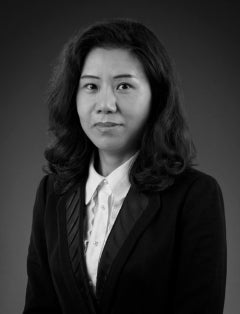Why accounting students need to learn more than the numbers
Professor says accountants are increasingly working in teams so the ability to support colleagues is crucial for career success
Professor says accountants are increasingly working in teams so the ability to support colleagues is crucial for career success
By Heather Bean University Relations Jee-Hae Lim wants her graduating accounting students to think about themselves as more than just future accountants.
Jee-Hae Lim wants her graduating accounting students to think about themselves as more than just future accountants.
“They’re citizens,” says Lim, a University of Waterloo professor in the School of Accounting and Finance. “I want them to think about citizenship, both regarding the business they work for and also this country we all live in. I want them not just to think about crunching numbers, but also to think, ‘how will this be helpful to my firm — how will this help my community?' ”
Lim, one of this year’s recipients of Waterloo’s Distinguished Teaching Award, says sometimes her students think accounting is all about memorization and numbers. “If you memorize all the requirements, that doesn’t make you number one. Don’t just memorize; don’t rely only on the textbook.” The soft skills that form relationships, she says, are just as important to accounting these days.
“Teamwork is very important. Students can get used to analyzing numbers by themselves, but these days as an accountant you don’t work by yourself. You have to know how to support others and learn from others.”
And Lim suggests that teamwork can help students discover their strengths: “Even if numbers isn’t your strongest area, you can shine in analytics or even in presentation skills — those are very important too.”
Lim’s emphasis on good citizenship in her classes means that former students often contact her looking for ways to give back to Waterloo, she says. Lim connects current and former students with similar interests. For new graduates, she points out, talking to alumni who were recently on the job market can be especially helpful. “I love to watch how they interact with each other. As a motivator, sometimes my role is just facilitator — to create settings, online or face to face, between alumni and current students.”
She’s impressed with the students she sees these days: “They are smart enough to know exactly where they are heading — they see their destination as so clear-cut.” But to her recent graduates, Lim says: Remember to look up from your path and engage with the people around you.

Read more
Researchers awarded funding to investigate ecology, climate change, repatriation, health and well-being through cultural and historical lens

Read more
Meet the 14 exceptional students representing Waterloo’s newest grads

Read more
“I’m excited to be in a place where I’m adding value, learning fast and living up to the Waterloo reputation of pushing boundaries.”
The University of Waterloo acknowledges that much of our work takes place on the traditional territory of the Neutral, Anishinaabeg, and Haudenosaunee peoples. Our main campus is situated on the Haldimand Tract, the land granted to the Six Nations that includes six miles on each side of the Grand River. Our active work toward reconciliation takes place across our campuses through research, learning, teaching, and community building, and is co-ordinated within the Office of Indigenous Relations.